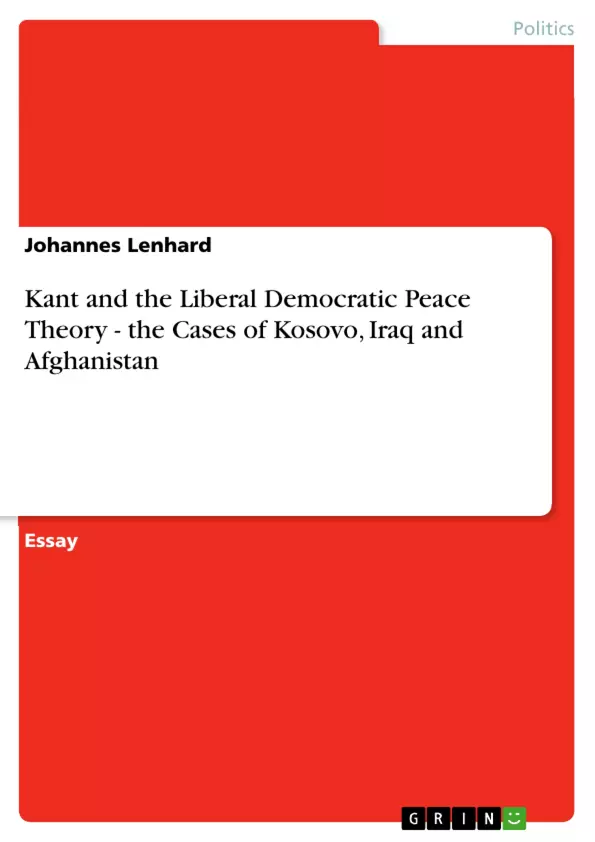Kosovo, Iraq and Afghanistan being the wars discussed most controversial in the last decade are also an important subject matter for the political theory (Kugler et al., 2004; Mearsheimer/Walt, 2003). Especially their use as falsifying cases against the liberal notion of democratic peace theory is prominent – though questionable (Panke/Risse, 2007). Kant and his successors in the tradition of the liberal democratic peace theory can to a certain extent be defended even considering the recent wars – at east on the surface; these were fought between despotic states and democracies and therefore do not stand in opposition to the liberal peace theory in its ‘narrow form’. Nevertheless, closer analysis reveals that the recent conflicts can be used as examples of severe violations of part of Kant’s predictions and arguments. These arguments will be exposed within the first part of the essay formulated by Immanuel Kant already in 1795 (Kant, 2007). Afterwards the theoretical discussion will be expanded towards contemporary followers, such as Doyle (1983). They form what is often stated as the liberal democratic peace theory. Subsequently, the cases of Kosovo, Iraq and Afghanistan as possible points of falsifications against the trustworthiness of the theoretical arguments presented beforehand will be analysed.
Inhaltsverzeichnis (Table of Contents)
- Introduction
- Kant’s Theoretical Framework
- Preliminary Articles
- Definitive Articles
- Contemporary Liberal Democratic Peace Theory
- Kosovo, Iraq and Afghanistan: Falsifying Cases?
- Conclusion
Zielsetzung und Themenschwerpunkte (Objectives and Key Themes)
This essay analyzes the conflicts in Kosovo, Afghanistan, and Iraq in relation to Kant’s liberal democratic peace theory. It aims to determine whether these wars can be considered falsifying cases against the theory. The main themes explored include:- The nature of democratic peace theory
- The role of republicanism, internationalism, and cosmopolitanism in achieving peace
- The applicability of Kant’s theory to contemporary conflicts
- The limitations of the liberal democratic peace theory
Zusammenfassung der Kapitel (Chapter Summaries)
The essay begins by outlining Kant’s theoretical framework for perpetual peace, emphasizing the importance of the six preliminary articles and the three definitive articles. The focus shifts to the three pillars of liberalism - republicanism, internationalism, and cosmopolitanism - and their implications for achieving peace. Kant's assumptions about the ‘world system’ and his vision of a federation of states are discussed in detail. The second part of the essay delves into contemporary liberal democratic peace theory, exploring its various interpretations and the main arguments put forward by prominent scholars like Doyle. The distinction between the “separate peace” argument and the general peacefulness of democratic states is explored. The essay concludes by analyzing the conflicts in Kosovo, Afghanistan, and Iraq, examining whether they can be considered falsifying cases against the liberal democratic peace theory. The arguments presented in the previous sections are utilized to assess the applicability of Kant's theory to these contemporary conflicts.Schlüsselwörter (Keywords)
The central keywords of this essay are: Kant, liberal democratic peace theory, republicanism, internationalism, cosmopolitanism, Kosovo, Afghanistan, Iraq, falsification, democratic peace, perpetual peace. These keywords represent the core concepts and themes explored in the text, focusing on the analysis of contemporary conflicts in relation to the theoretical foundations of the liberal democratic peace theory.Frequently Asked Questions
What is Kant's Liberal Democratic Peace Theory?
Based on Immanuel Kant's 1795 essay "Perpetual Peace," the theory posits that democratic (republican) states are less likely to go to war with one another due to shared values and institutional constraints.
What are the three pillars of Kant's perpetual peace?
The three pillars are Republicanism (internal constitution), Internationalism (a federation of free states), and Cosmopolitanism (universal hospitality/rights).
Do the wars in Iraq and Afghanistan falsify the theory?
The essay explores this controversy, noting that while these were wars between democracies and despotic states, they reveal severe violations of Kant's original arguments regarding non-interference.
What is the "separate peace" argument?
It is the idea that while democracies may fight non-democracies, they maintain a "separate peace" among themselves, creating a zone of stability.
How does Kant view the "federation of states"?
Kant envisioned a "foedus pacificum" or pacific alliance that would gradually expand to include all states, ultimately ending all wars through international law.
- Quote paper
- Johannes Lenhard (Author), 2010, Kant and the Liberal Democratic Peace Theory - the Cases of Kosovo, Iraq and Afghanistan, Munich, GRIN Verlag, https://www.grin.com/document/147664



